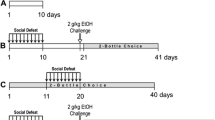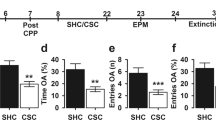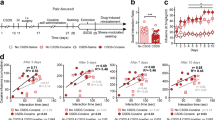Abstract
Rationale
Stress exposure has been identified as one risk factor for alcohol abuse that may facilitate the transition from social or regulated alcohol use to the development of alcohol dependence. Additionally, stress is a common trigger for relapse and subsequent loss of control of drinking in alcohol-dependent individuals.
Objectives
The present study was designed to characterize effects of repeated forced swim stress (FSS) on ethanol consumption in three rodent drinking models that engender high levels of ethanol consumption.
Methods
Adult male C57BL/6J mice were exposed to 10-min FSS 4 h prior to each drinking session in three different models of high ethanol consumption: chronic intermittent ethanol (CIE) drinking (a model of dependence-like drinking), drinking-in-the-dark (DID; a model of binge-like drinking), and intermittent vs. continuous access (a model of escalated drinking).
Results
In the CIE drinking paradigm, daily FSS facilitated the escalation of ethanol intake that is typically seen in CIE-exposed mice without altering ethanol consumption in control mice exposed to FSS. FSS prior to drinking sessions did not alter ethanol consumption in the DID or intermittent access paradigms, whereas stressed mice in the continuous access procedure consumed less ethanol than their nonstressed counterparts.
Conclusions
The CIE drinking paradigm may provide a helpful preclinical model of stress-induced transition to ethanol dependence that can be used to (1) identify underlying neural mechanisms that facilitate this transition and (2) evaluate the therapeutic potential of various pharmacological agents hypothesized to alleviate stress-induced drinking.





Similar content being viewed by others
References
Bahi A (2013) Increased anxiety, voluntary alcohol consumption and ethanol-induced place preference in mice following chronic psychosocial stress. Stress 16:441–451
Becker HC (2012) Effects of alcohol dependence and withdrawal on stress responsiveness and alcohol consumption. Alcohol Res 34:448–458
Becker HC (2013) Animal models of excessive alcohol consumption in rodents. Curr Top Behav Neurosci 13:355–377
Becker HC, Lopez MF, Doremus-Fitzwater TL (2011) Effects of stress on alcohol drinking: a review of animal studies. Psychopharmacology (Berl) 218:131–156
Breese GR, Knapp DJ, Overstreet DH (2004) Stress sensitization of ethanol withdrawal-induced reduction in social interaction: inhibition by CRF-1 and benzodiazepine receptor antagonists and a 5-HT1A-receptor agonist. Neuropsychopharmacology 29:470–482
Butler TR, Ariwodola OJ, Weiner JL (2014) The impact of social isolation on HPA axis function, anxiety-like behaviors, and ethanol drinking. Front Integr Neurosci 7:102
Cox BR, Olney JJ, Lowery-Gionta EG, Sprow GM, Rinker JA, Navarro M, Kash TL, Thiele TE (2013) Repeated cycles of binge-like ethanol (EtOH)-drinking in male C57BL/6J mice augments subsequent voluntary EtOH intake but not other dependence-like phenotypes. Alcohol Clin Exp Res 37:1688–1695
Crabbe JC, Harkness JH, Spence SE, Huang LC, Metten P (2012) Intermittent availability of ethanol does not always lead to elevated drinking in mice. Alcohol Alcohol 47:509–517
Cruz FC, Quadros IM, Planeta Cda S, Miczek KA (2008) Maternal separation stress in male mice: long-term increases in alcohol intake. Psychopharmacology 201:459–468
Edwards S, Baynes BB, Carmichael CY, Zamora-Martinez ER, Barrus M, Koob GF, Gilpin NW (2013) Traumatic stress reactivity promotes excessive alcohol drinking and alters the balance of prefrontal cortex-amygdala activity. Transl Psychiatry 3:e296
Gillett K, Harshberger E, Valdez GR (2013) Protracted withdrawal from ethanol and enhanced responsiveness stress: regulation via the dynorphin/kappa opioid receptor system. Alcohol 47:359–365
Griffin WC 3rd, Lopez MF, Becker HC (2009) Intensity and duration of chronic ethanol exposure is critical for subsequent escalation of voluntary ethanol drinking in mice. Alcohol Clin Exp Res 33:1893–1900
Hwa LS, Chu A, Levinson SA, Kayyali TM, DeBold JF, Miczek KA (2011) Persistent escalation of alcohol drinking in C57BL/6J mice with intermittent access to 20 % ethanol. Alcohol Clin Exp Res 35:1938–1947
Hwa LS, Holly EN, DeBold JF, Miczek KA (2016) Social stress-escalated intermittent alcohol drinking: modulation by CRF-R1 in the ventral tegmental area and accumbal dopamine in mice. Psychopharmacol 233:681–690. doi:10.1007/s00213-015-4144-2
Kissler JL, Sirohi S, Reis DJ, Jansen HT, Quock RM, Smith DG, Walker BM (2014) The one-two punch of alcoholism: role of central amygdala dynorphins/kappa-opioid receptors. Biol Psychiatry 75:774–782
Knapp DJ, Overstreet DH, Breese GR (2007) Baclofen blocks expression and sensitization of anxiety-like behavior in an animal model of repeated stress and ethanol withdrawal. Alcohol Clin Exp Res 31:582–595
Koob GF (2013) Addiction is a reward deficit and stress surfeit disorder. Front Psychiatry 4:72
Logrip ML, Zorrilla EP (2012) Stress history increases alcohol intake in relapse: relation to phosphodiesterase 10A. Addict Biol 17:920–933
Lopez MF, Doremus-Fitzwater TL, Becker HC (2011) Chronic social isolation and chronic variable stress during early development induce later elevated ethanol intake in adult C57BL/6J mice. Alcohol 45:355–364
Lopez MF, Anderson RI, Becker HC (2016) Effect of different stressors on voluntary ethanol intake in ethanol-dependent and nondependent C57BL/6J mice. Alcohol 51:17–23
Lovinger DM, Crabbe JC (2005) Laboratory models of alcoholism: treatment target identification and insight into mechanisms. Nat Neurosci 8:1471–1480
McCool BA, Chappell AM (2009) Early social isolation in male Long-Evans rats alters both appetitive and consummatory behaviors expressed during operant ethanol self-administration. Alcohol Clin Exp Res 33:273–282
Meyer EM, Long V, Fanselow MS, Spigelman I (2013) Stress increases voluntary alcohol intake, but does not alter established drinking habits in a rat model of posttraumatic stress disorder. Alcohol Clin Exp Res 37:566–574
National Research Council (2011) Guide for the care and use of laboratory animals, 8th edition. doi:10.17226/12910
Noori HR, Helinski S, Spanagel R (2014) Cluster and meta-analyses on factors influencing stress-induced alcohol drinking and relapse in rodents. Addict Biol 19:225–232
Norman KJ, Seiden JA, Klickstein JA, Han X, Hwa LS, DeBold JF, Miczek KA (2015) Social stress and escalated drug self-administration in mice I. Alcohol and corticosterone. Psychopharmacology 232:991–1001
Rhodes JS, Best K, Belknap JK, Finn DA, Crabbe JC (2005) Evaluation of a simple model of ethanol drinking to intoxication in C57BL/6J mice. Physiol Behav 84:53–63
Simms JA, Steensland P, Medina B, Abernathy KE, Chandler LJ, Wise R, Bartlett SE (2008) Intermittent access to 20 % ethanol induces high ethanol consumption in Long-Evans and Wistar rats. Alcohol Clin Exp Res 32:1816–1823
Sinha R (2012) How does stress lead to risk of alcohol relapse? Alcohol Res 34:432–440
Sommer WH, Rimondini R, Hansson AC, Hipskind PA, Gehlert DR, Barr CS, Heilig MA (2008) Upregulation of voluntary alcohol intake, behavioral sensitivity to stress, and amygdala crhr1 expression following a history of dependence. Biol Psychiatry 63:139–145
Sperling RE, Gomes SM, Sypek EI, Carey AN, McLaughlin JP (2010) Endogenous kappa-opioid mediation of stress-induced potentiation of ethanol-conditioned place preference and self-administration. Psychopharmacology (Berl) 210:199–209
Thiele TE, Navarro M (2014) “Drinking in the dark” (DID) procedures: a model of binge-like ethanol drinking in non-dependent mice. Alcohol 48:235–241
Uhart M, Wand GS (2009) Stress, alcohol and drug interaction: an update of human research. Addict Biol 14:43–64
Valdez GR, Zorrilla EP, Roberts AJ, Koob GF (2003) Antagonism of corticotropin-releasing factor attenuates the enhanced responsiveness to stress observed during protracted ethanol abstinence. Alcohol 29:55–60
Vendruscolo LF, Barbier E, Schlosburg JE, Misra KK, Whitfield TW Jr, Logrip ML, Rivier C, Repunte-Canonigo V, Zorrilla EP, Sanna PP, Heilig M, Koob GF (2012) Corticosteroid-dependent plasticity mediates compulsive alcohol drinking in rats. J Neurosci 32:7563–7571
Walker BM, Zorrilla EP, Koob GF (2011) Systemic kappa-opioid receptor antagonism by nor-binaltorphimine reduces dependence-induced excessive alcohol self-administration in rats. Addict Biol 16:116–119
Acknowledgments
This work was funded by NIAAA grants P50 AA 10761 (HCB), U01 AA01095 (HCB), and U01 AA020929 (MFL). RIA was supported by T32 AA007474 and F32 AA023700. The authors wish to thank Chelsea Johnson, Joshua Palmer, and India Robbins for technical assistance.
Author information
Authors and Affiliations
Corresponding author
Ethics declarations
Conflict of interest
All authors declare that they have no conflicts of interest.
Rights and permissions
About this article
Cite this article
Anderson, R.I., Lopez, M.F. & Becker, H.C. Forced swim stress increases ethanol consumption in C57BL/6J mice with a history of chronic intermittent ethanol exposure. Psychopharmacology 233, 2035–2043 (2016). https://doi.org/10.1007/s00213-016-4257-2
Received:
Accepted:
Published:
Issue Date:
DOI: https://doi.org/10.1007/s00213-016-4257-2




